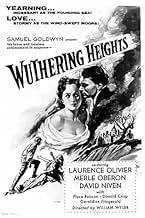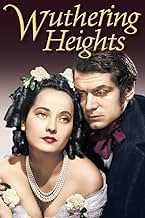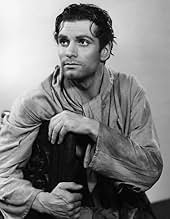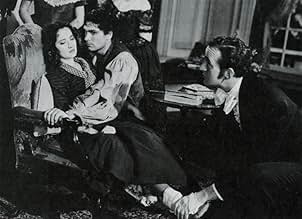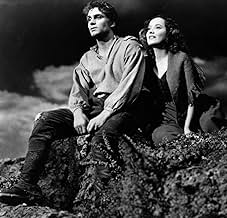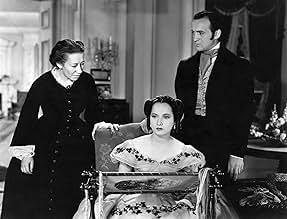IMDb-BEWERTUNG
7,5/10
20.777
IHRE BEWERTUNG
Ein Diener im Haus der Sturmhöhe erzählt einem Reisenden die unglückliche Geschichte der Liebhaber Cathy und Heathcliff.Ein Diener im Haus der Sturmhöhe erzählt einem Reisenden die unglückliche Geschichte der Liebhaber Cathy und Heathcliff.Ein Diener im Haus der Sturmhöhe erzählt einem Reisenden die unglückliche Geschichte der Liebhaber Cathy und Heathcliff.
- 1 Oscar gewonnen
- 9 Gewinne & 7 Nominierungen insgesamt
Sarita Wooton
- Cathy (as a child)
- (as Sarita Wooten)
Frank Benson
- Heathcliff Servant
- (Nicht genannt)
Romaine Callender
- Robert
- (Nicht genannt)
Richard Clucas
- Little Boy
- (Nicht genannt)
Vernon Downing
- Giles
- (Nicht genannt)
Empfohlene Bewertungen
Great literature enriches the soul. The Brontes created great literature because they invented so much of what it means. They invented ways of observing the soul that hadn't already been mined by Shakespeare. If you want a great film that celebrates, explores, exploits Bronte, you can't escape the reality that you'd have to stretch film the same way Charlotte stretched perspective.
Didn't happen here. Olivier seemed good enough at what he knew (stage acting) but that isn't bendable to great experiences in film. Never was.
But you might want to watch this for another reason. The dialog and acting are ordinarily conceived. But the cinematography is extraordinary, from the very special Greg Toland. Greg DID stretch cinema in the way we mentioned. His greys have depth. When he photographs the heath, we feel the atmosphere as if the mist had emotion.
The interiors of the house are magnificent in design. And Toland's lighting and framing are so haunting.
This film is why Orson Welles wanted him on "Citizen Kane." You need to watch it to see where much of the disembodied ghost-observer comes from. With Toland, Cathy defines what we see and how.
But the actual story? Go read it instead.
Ted's Evaluation -- 2 of 3: Has some interesting elements.
Didn't happen here. Olivier seemed good enough at what he knew (stage acting) but that isn't bendable to great experiences in film. Never was.
But you might want to watch this for another reason. The dialog and acting are ordinarily conceived. But the cinematography is extraordinary, from the very special Greg Toland. Greg DID stretch cinema in the way we mentioned. His greys have depth. When he photographs the heath, we feel the atmosphere as if the mist had emotion.
The interiors of the house are magnificent in design. And Toland's lighting and framing are so haunting.
This film is why Orson Welles wanted him on "Citizen Kane." You need to watch it to see where much of the disembodied ghost-observer comes from. With Toland, Cathy defines what we see and how.
But the actual story? Go read it instead.
Ted's Evaluation -- 2 of 3: Has some interesting elements.
Being a classic film buff, I had the chance of being introduced to this film by chance one late evening when it was being aired on TCM. I fell in love with the movie, and when I was told that it would be required reading over the summer, I was ridiculously happy. As many have noted, the 1939 adaptation of "Wuthering Heights" is, more or less, merely the first volume of Emily Bronte's beautifully and powerfully written classic -- focusing less on the detail of Heathcliff's wrath post Cathy's death, but moreso on the sheer complexity of Heathcliff and Cathy's relationship (the scenes at Penniston Crag of them among the moors and heather are not in the book because Bronte had to stick to Ellen's point of view -- it was nice that we could finally have an in-depth look at the tumultuous relationship between Cathy and Heathcliff). While characters are omitted (Frances, Hareton, Linton and the baby Catherine), it still retains much of the very nature of the novel. (If you will recall, many parts of "Gone With The Wind" were changed and characters removed in the process of transferring Margaret Mitchell's masterpiece into a screen epic. After all, this is Hollywood.)
The cinematography is divine (very much worth its Oscar), perfectly capturing the very essence of the bleak, chilling, haunting Yorkshire Moors that Bronte described in her book. Laurence Olivier is, in my opinion, a very fine Heathcliff. Indeed, in the book his nature is more animalistic and devilish, but Olivier superbly exhibits what Heathcliff is all about -- dark, brooding, and terribly bitter. Even at our first introduction to him, we know by the tone of his voice that something is very, very wrong with this man and that something is very, very off in that household. Olivier expresses Heathcliff's wildness and devilishness through his voice, stance and through his facial gestures, rather than so much in other physical ways. Merle Oberon is remarkable as Cathy -- a much more dark and exoctic beauty than Isabella whose good looks are very wholesome and pure (perhaps to match the darkness of the gypsy stable-boy Heathcliff), and capturing the duality of personality that is Catherine Earnshaw -- part of her wanting to love a wild, evil, wicked stable boy... the other part longing to be part of a higher society. Particularly coming to mind is her scene in the kitchen with Ellen and that marvelously disturbing death scene -- her eyes wild. (I do wish they would have left in the part of the book where she refuses to eat and begins hallucinating -- Oberon could have performed it so well.) Also to be noted are the stunning performances of David Niven and Gerladine Fitzgerald as the long-suffering Edgar and Isabella Linton (respectively), their lives made miserable by Cathy's selfishness, vanity and greed to be part of a higher way of living, and by Heathcliff's undying love for Catherine and his course of revenge and destruction. Flora Robson is also wonderful as Ellen Dean, narrator of the whole sordid story.
Someone mentioned that this film (by focusing on the love story and by the ending, I suppose) tried to say that Heathcliff and Catherine were perfect for each other and could have, eventually, found true love. I disagree, wholeheartedly. I believe what director William Wyler was trying to say here was that Heathcliff and Catherine were not good people. Cathy was right when she said that she and Heathcliff's souls were made of the same basic fiber -- they were both greedy and selfish (he wanted her passion for him to be as deep as his passion for her and she wanted and if he couldn't have it, no one else deserved to have it, and God forbid those around him feel any kind of love, compassion or humanity; and she didn't even really know what she wanted, except to be part of the upper crust and to rise above what she had lived through when Hindley became master of their house) and because of that, their love could have never meant anything BUT tragedy. They could never have found happiness together because they were not happy people. But they could find love in death -- because in death, they could be what they really were all along -- children; mere children forced to grow up all too quickly with the death of the man who cared deeply for them, thus forcing Hindley to become head of the household. There would be no Hindley in death. And as children they were good together -- as children, Cathy, wicked as she was at times as a youngster, could restore hopes of prosperity to Heathcliff's dark, bitter soul. They were, as children, more or less all one another had. And so they could go on, as children, without a care, happily picking heather and being King and Queen on the moors.
You've GOT to see this movie.
The cinematography is divine (very much worth its Oscar), perfectly capturing the very essence of the bleak, chilling, haunting Yorkshire Moors that Bronte described in her book. Laurence Olivier is, in my opinion, a very fine Heathcliff. Indeed, in the book his nature is more animalistic and devilish, but Olivier superbly exhibits what Heathcliff is all about -- dark, brooding, and terribly bitter. Even at our first introduction to him, we know by the tone of his voice that something is very, very wrong with this man and that something is very, very off in that household. Olivier expresses Heathcliff's wildness and devilishness through his voice, stance and through his facial gestures, rather than so much in other physical ways. Merle Oberon is remarkable as Cathy -- a much more dark and exoctic beauty than Isabella whose good looks are very wholesome and pure (perhaps to match the darkness of the gypsy stable-boy Heathcliff), and capturing the duality of personality that is Catherine Earnshaw -- part of her wanting to love a wild, evil, wicked stable boy... the other part longing to be part of a higher society. Particularly coming to mind is her scene in the kitchen with Ellen and that marvelously disturbing death scene -- her eyes wild. (I do wish they would have left in the part of the book where she refuses to eat and begins hallucinating -- Oberon could have performed it so well.) Also to be noted are the stunning performances of David Niven and Gerladine Fitzgerald as the long-suffering Edgar and Isabella Linton (respectively), their lives made miserable by Cathy's selfishness, vanity and greed to be part of a higher way of living, and by Heathcliff's undying love for Catherine and his course of revenge and destruction. Flora Robson is also wonderful as Ellen Dean, narrator of the whole sordid story.
Someone mentioned that this film (by focusing on the love story and by the ending, I suppose) tried to say that Heathcliff and Catherine were perfect for each other and could have, eventually, found true love. I disagree, wholeheartedly. I believe what director William Wyler was trying to say here was that Heathcliff and Catherine were not good people. Cathy was right when she said that she and Heathcliff's souls were made of the same basic fiber -- they were both greedy and selfish (he wanted her passion for him to be as deep as his passion for her and she wanted and if he couldn't have it, no one else deserved to have it, and God forbid those around him feel any kind of love, compassion or humanity; and she didn't even really know what she wanted, except to be part of the upper crust and to rise above what she had lived through when Hindley became master of their house) and because of that, their love could have never meant anything BUT tragedy. They could never have found happiness together because they were not happy people. But they could find love in death -- because in death, they could be what they really were all along -- children; mere children forced to grow up all too quickly with the death of the man who cared deeply for them, thus forcing Hindley to become head of the household. There would be no Hindley in death. And as children they were good together -- as children, Cathy, wicked as she was at times as a youngster, could restore hopes of prosperity to Heathcliff's dark, bitter soul. They were, as children, more or less all one another had. And so they could go on, as children, without a care, happily picking heather and being King and Queen on the moors.
You've GOT to see this movie.
Talk about a brooding outdoors, those moody moors may represent a sense of liberation for the lovers, but they're not exactly inviting. Besides, it rains all the time, so best to be in the house even if mansions represent the confining space of class and class privilege. That's the trouble. Cathy is 'to the manor born', as they say. Thus she's really torn between the wild outdoors and the comforts of ballrooms and servants.
Then there's the enigmatic Heathcliffe, a dark wild-souled type guy, perfectly at home in those bleak rolling hills. He was a street ragamuffin before Cathy's elderly father adopted him into the manor as a stable boy. But he and a young Cathy manage to bond despite the class difference, a bond that eventually blossoms into true love. But that true love only breaks to the surface in the wild outdoors where a common humanity replaces artificial social distinctions. If only Cathy could find the will to break free of the leisure class.
What a great visual experience, the b&w expertly coordinated with the settings. When the two lovers approach the rocky crag, there's almost a feeling of an outdoor altar calling to them amidst the brooding hills. It's such a perfect visual contrast to the high-key ballrooms and parlors of the Lintons. The Lintons, however, are not to be despised despite their airs and privileges. In fact, they are very real victims of Cathy's suppressed feelings and Heathcliffe's cold calculations. As it turns out, there is no spectral salvation for them. As a result, the love being portrayed here is a kind of mad love, one that brings tragedy to all concerned. Thus, there's a reason those moors brood in dark fashion, while the movie itself remains the best of the many makes and remakes.
Then there's the enigmatic Heathcliffe, a dark wild-souled type guy, perfectly at home in those bleak rolling hills. He was a street ragamuffin before Cathy's elderly father adopted him into the manor as a stable boy. But he and a young Cathy manage to bond despite the class difference, a bond that eventually blossoms into true love. But that true love only breaks to the surface in the wild outdoors where a common humanity replaces artificial social distinctions. If only Cathy could find the will to break free of the leisure class.
What a great visual experience, the b&w expertly coordinated with the settings. When the two lovers approach the rocky crag, there's almost a feeling of an outdoor altar calling to them amidst the brooding hills. It's such a perfect visual contrast to the high-key ballrooms and parlors of the Lintons. The Lintons, however, are not to be despised despite their airs and privileges. In fact, they are very real victims of Cathy's suppressed feelings and Heathcliffe's cold calculations. As it turns out, there is no spectral salvation for them. As a result, the love being portrayed here is a kind of mad love, one that brings tragedy to all concerned. Thus, there's a reason those moors brood in dark fashion, while the movie itself remains the best of the many makes and remakes.
I have not read the Emily Bronte novel on which this film is based so obviously I cannot comment on the effectiveness of it as an adaptation (I understand that almost the entire second half of the book was excised). However, I thoroughly enjoyed the film. Oberon and especially Olivier, one of my favorites, are very convincing and moving as the doomed lovers Cathy and Heathcliff (according to my friend, Heathcliff is written as being much more likeable in the film than in the book). The supporting cast was also very good. Wuthering Heights just deals very poignantly with the effect that birth and status have on people's lives. Yet another winner from Wyler. My score 9/10.
SPOILERS Out of the cinematic versions of Emily Bronte's incredible tale, this 1939 version is one of the furthest from it. However, as a piece of cinematic art, it is the finest, a shining example of Hollywood craftmanship made at a time when so many classic movies were being churned out. Producer Sam Goldwyn said it was the best movie he ever made. It's certainly director William Wyler's best film, and that includes Ben Hur. While Bronte's novel is a lot more than just a love story, this almost reduces it to being just a love story. Never mind, because as a love story, this film works wonderfully. Like almost all great love stories, it's gloriously romantic, emotionally intense and ultimately incredibly moving.
The controversial decision to miss out almost the entire second half of the book allowed the filmmakers to concentrate on the Heathcliff/Cathy love story, and Laurence Olivier and Merle Oberon both have incredible chemistry and strengh in their performances. No, they are not Bronte's characters, especially the film's version of Heathcliff, who here is FAR too nice, but are definitely one of the greatest of Hollywood's cinematic couples. This is especially notable in the scenes set on the moors, where we are definitely in that Olde Hollywood romantic never never land where the music soars and passion had to be, and was, encapsulated in a kiss. Olivier is impressive delivering some of Bronte's lines, of which there are a surprising amount, and the film does follow the book's plot very closely, it just tones down the darkness.
There are many superbly done sequences- the incredibly atmospheric opening where a traveller arrives at Heathcliff's house, all the scenes on the moors, Cathy's speech to Nelly "I AM Heathcliff", and of course, more than any other scene, the death of Cathy. As Heathcliff takes the dying Cathy to the window to see the moors once more and she finally dies virtually standing up, all the while while Alfred Newman's love theme plays and plays. This is one of the moving and also one of the most beautiful and artistic deaths in Hollywood history, all the more powerful for actually being comparatively understated by Hollywood standards of the time. Only those who had read the book or knew of the missing second half would know there was more in the story to come, in the context of the film the tale seems complete. Some don't like the final scene of Heathcliff and Cathy's ghosts wondering in the snow, but it is actually closer to the book's actual ending than most seem to admit. It's also one of the best tearjerkers ever, period.
Most people read the book and are than disappointed when they see this. It's therefore best to see this first, and to appreciate it as one of the great Hollywood love stories, before THAN reading the book. Yes, the book is still better, but than most books are.
The controversial decision to miss out almost the entire second half of the book allowed the filmmakers to concentrate on the Heathcliff/Cathy love story, and Laurence Olivier and Merle Oberon both have incredible chemistry and strengh in their performances. No, they are not Bronte's characters, especially the film's version of Heathcliff, who here is FAR too nice, but are definitely one of the greatest of Hollywood's cinematic couples. This is especially notable in the scenes set on the moors, where we are definitely in that Olde Hollywood romantic never never land where the music soars and passion had to be, and was, encapsulated in a kiss. Olivier is impressive delivering some of Bronte's lines, of which there are a surprising amount, and the film does follow the book's plot very closely, it just tones down the darkness.
There are many superbly done sequences- the incredibly atmospheric opening where a traveller arrives at Heathcliff's house, all the scenes on the moors, Cathy's speech to Nelly "I AM Heathcliff", and of course, more than any other scene, the death of Cathy. As Heathcliff takes the dying Cathy to the window to see the moors once more and she finally dies virtually standing up, all the while while Alfred Newman's love theme plays and plays. This is one of the moving and also one of the most beautiful and artistic deaths in Hollywood history, all the more powerful for actually being comparatively understated by Hollywood standards of the time. Only those who had read the book or knew of the missing second half would know there was more in the story to come, in the context of the film the tale seems complete. Some don't like the final scene of Heathcliff and Cathy's ghosts wondering in the snow, but it is actually closer to the book's actual ending than most seem to admit. It's also one of the best tearjerkers ever, period.
Most people read the book and are than disappointed when they see this. It's therefore best to see this first, and to appreciate it as one of the great Hollywood love stories, before THAN reading the book. Yes, the book is still better, but than most books are.
Wusstest du schon
- WissenswertesLaurence Olivier found himself becoming increasingly annoyed with director William Wyler's exhausting style of filmmaking. After yet another take, he is said to have exclaimed, "For God's sake, I did it sitting down. I did it with a smile. I did it with a smirk. I did it scratching my ear. I did it with my back to the camera. How do you want me to do it?" Wyler's retort was, "I want it better." However, Olivier later said these multiple takes helped him learn to succeed as a movie actor.
- PatzerThough the social situations, and even the soundtrack, are consistent with the novel's timeframe of 1770-1801, the Colonial/Napoleonic era, the costumes are an odd mix of mid-Victorian and American Civil War.
- Zitate
Heathcliff: Catherine Earnshaw, may you not rest so long as I live on! I killed you. Haunt me, then! Haunt your murderer! I know that ghosts have wandered on the Earth. Be with me always. Take any form, drive me mad, only do not leave me in this dark alone where I cannot find you. I cannot live without my life! I cannot die without my soul.
- Crazy CreditsOpening credits prologue: On the barren Yorkshire moors in England, a hundred years ago, stood a house as bleak and desolate as the wastes around it. Only a stranger lost in a storm would have dared to knock at the door of Wuthering Heights.
- Alternative VersionenThere is an Italian edition of this film on DVD, distributed by DNA Srl: "CIME TEMPESTOSE (1939) + ORGOGLIO E PREGIUDIZIO (1940)" (2 Films on a single DVD), re-edited with the contribution of film historian Riccardo Cusin. This version is also available for streaming on some platforms.
- VerbindungenFeatured in Salut für ...: A Tribute to William Wyler (1976)
- SoundtracksPiano Sonata in A major, K.331: Rondo alla Turca
(1778) (uncredited)
Music by Wolfgang Amadeus Mozart
Played by Alice Ehlers on harpsichord
Top-Auswahl
Melde dich zum Bewerten an und greife auf die Watchlist für personalisierte Empfehlungen zu.
Details
- Erscheinungsdatum
- Herkunftsland
- Offizieller Standort
- Sprache
- Auch bekannt als
- Sturmhöhe
- Drehorte
- Produktionsfirma
- Weitere beteiligte Unternehmen bei IMDbPro anzeigen
Box Office
- Bruttoertrag in den USA und Kanada
- 624.643 $
- Eröffnungswochenende in den USA und in Kanada
- 15.493 $
- 9. Apr. 1989
- Weltweiter Bruttoertrag
- 624.643 $
- Laufzeit1 Stunde 44 Minuten
- Farbe
- Seitenverhältnis
- 1.37 : 1
Zu dieser Seite beitragen
Bearbeitung vorschlagen oder fehlenden Inhalt hinzufügen



